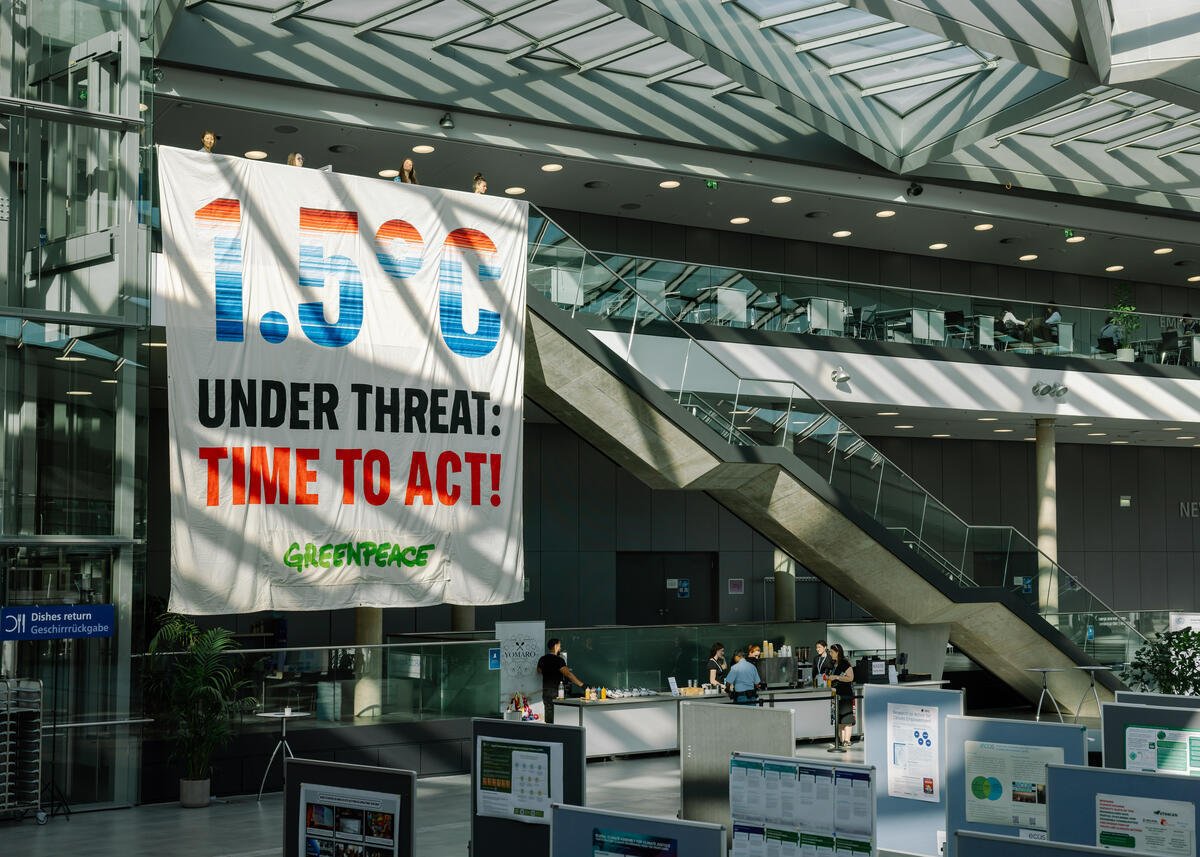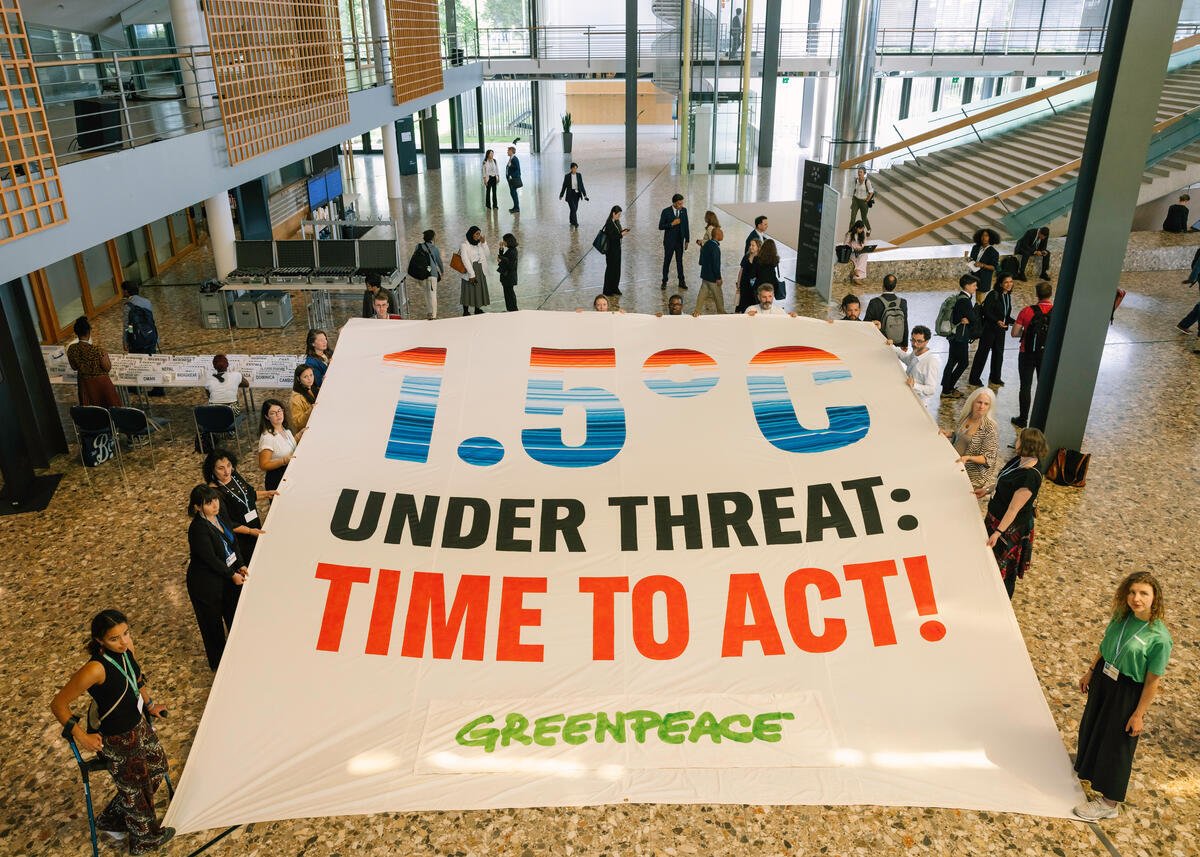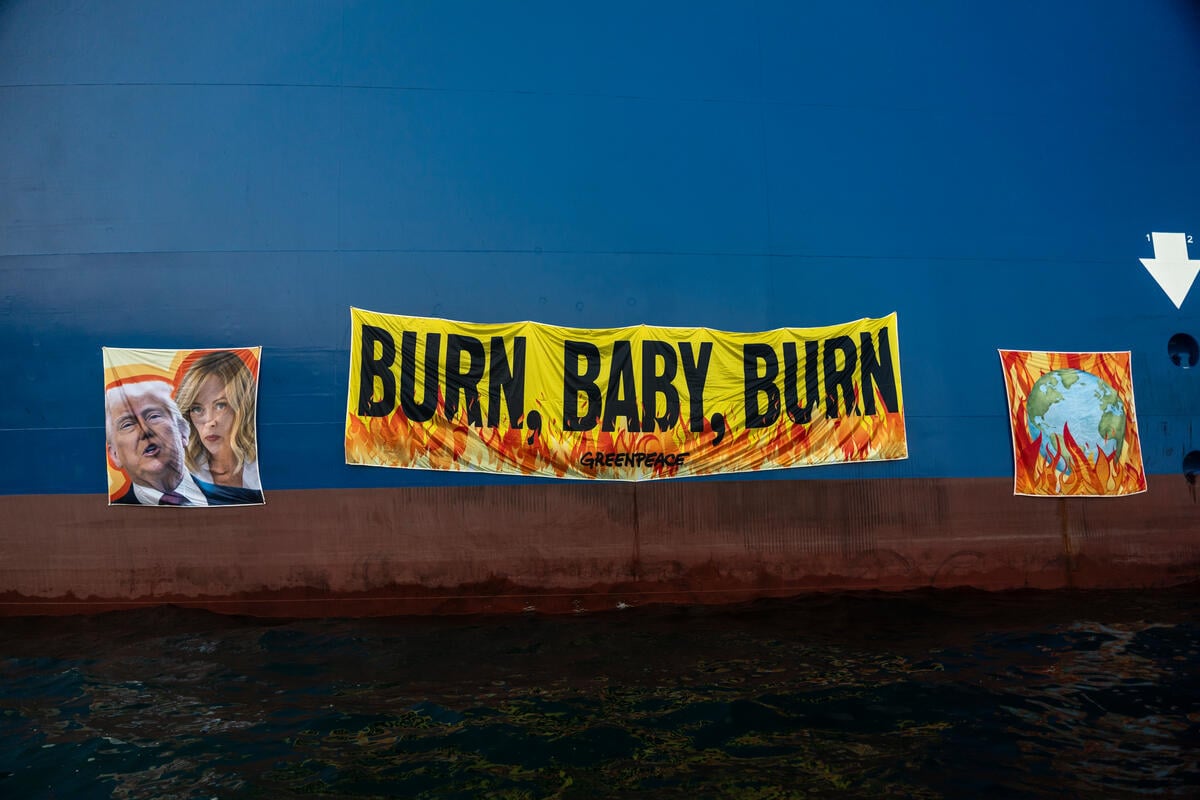Activists from climate-hit countries exposed Shell’s reckless plans to drill for more oil and gas, as the company announced record profits. The protest was Greenpeace’s longest ever occupation of a moving oil platform.
How it happened
- Greenpeace International activists boarded a ship carrying crucial equipment for Shell to produce more oil and gas in the North Sea.
- Together they occupied the equipment throughout the nearly 4,000km journey, highlighting Shell’s reckless plans to keep drilling for more fossil fuels.
- As Shell announced record annual profits of £32bn, the activists told the other side of the story: Shell are knowingly making climate change worse, and this is destroying lives and livelihoods all over the world.
- As the ship arrived in the Norwegian port of Haugesund, the activists ended their 13 day occupation with a simple message to Shell: Enough is enough. Stop drilling and start paying for the climate destruction you’ve caused.
Latest updates
- NEW: The occupation has ended. On Sunday 12 February, the activists left the ship as it arrived at Haugesund in Norway. None of the activists were arrested by Norwegian authorities. In a final stand at 10.30am, they climbed the platform’s 125m flare boom, and waved a banner saying ‘Stop drilling. Start Paying.’
- NEW: “Just the beginning”: Greenpeace activist Yeb Saño said “Shell might think this is the end of our protest, but my message to chief executive Wael Sawan is that this is just the beginning. We are seeing people connecting the dots between fossil fuel mega profits and the bill for climate loss and damage. It is right that the likes of Shell must pay for devastation that they are directly causing.”
- Greenpeace has been hit with a legal claim demanding it pays Shell more than $120,000 for alleged damage caused by activists on board its oil platform. Lawyers are not able to provide any detail on what damage is alleged. Based on Shell’s 2022 profits, it would take them two minutes to make the $120,000 being claimed from Greenpeace, the equivalent of 0.0003% of Shell’s profits last year.
- More people join the protest: Shell tried to silence the peaceful occupation of its oil and gas platform with a court order threatening up to two years’ jail time and fines. But instead, Greenpeace International escalated the protest by adding two more climbers to the platform – using other boats unaffected by the order. People from Africa, the Middle East and Europe joined the protest in the English Channel.
- Shell’s record profits: On 2 February, Shell announced record annual profits of $39.9bn. That’s over double what Pakistan needs to recover from last year’s devastating floods. Activists set up a mock petrol station price board outside the company’s London HQ, highlighting their profits and their failure to pay for climate damage.
- Activists on board: On 31 January, four activists boarded Shell’s ship occupying its huge cargo: an essential bit of oil and gas production equipment bound for the North Sea. Greenpeace’s ship the Arctic Sunrise chased at full speed, to catch up and stay in communication with the activists.
Why Greenpeace is taking action against Shell
- By drilling for more oil and gas, Shell are knowingly making climate change worse.
- This is destroying people’s lives around the world – often the people who did least to cause the problem.
- So while Shell makes billions in profits, they’re also causing billions of dollars of climate damage.
- That’s simply not fair, so Greenpeace is taking action to put it right.
- We’re calling on Shell to stop drilling and start paying for the climate damage they’ve caused.
- The world can’t stop using oil and gas overnight. But drilling for more fossil fuels isn’t the answer.
- There’s already more oil and gas available than we can safely burn, and experts say more drilling won’t even help reduce energy prices.
What you can do
Sign the petition
You can put pressure on the fossil fuel industry by joining the call for climate justice. Petitions alone can’t save the world, but adding your name is a powerful way to show how many people are demanding change:
Tell Shell: Stop Drilling. Start Paying
Shell doesn’t have much of a social media presence but can you send a message to Shell on Twitter?
Tell people what’s happening
Think about someone in your life who’d want to know about this, and link them here, or to Greenpeace’s posts on social media.
Some important facts
There’s a basic injustice at the heart of the climate issue: the people suffering the most are often the ones who did least to cause the problem. Countries like Pakistan, Somalia and the Philippines were rocked by climate disasters in 2022, but people there create much less carbon pollution than those in richer countries.
Climate chaos: Climate change, driven by Shell and other fossil fuel companies, is causing huge damage and disruption worldwide. Some estimates put the cost to poor countries at half a trillion dollars and 293,000 lives.
Shell’s plan: the ship is carrying a piece of equipment called a floating production storage and offloading unit that they’ll use to ‘redevelop’ the ‘Penguins’ oil and gas field in the North Sea. Essentially, they’re planning to squeeze every last barrel out of this field. In the middle of a climate crisis.
How much oil and gas? Shell’s equipment would enable them to pump out the equivalent of up to 45,000 barrels of oil a day from the Penguins field. Burning all the oil and gas they get from this project would create 45m tonnes of CO2. That’s more than the entire annual emissions of Norway.
Drilling for more oil and gas is only good for Shell’s profits: Nobody’s saying we can stop all oil and gas use immediately. But that’s not a reason to drill new wells. There’s already more than enough oil and gas available to keep things going while we switch to clean energy.
Experts say that adding drilling for more oil and gas won’t help bring down energy costs. So this isn’t about supplying people’s needs – it’s about Shell keeping the world hooked on its products, and slowing the shift to better energy sources.
Covering the cost: It’s estimated the fossil fuel industry made enough profit from 2000-2019 to cover the cost of climate losses in 55 climate-vulnerable countries nearly 60 times over.
This is personal: Many of the people involved in this action have been personally affected by climate disaster. You can read the crew’s stories here.



